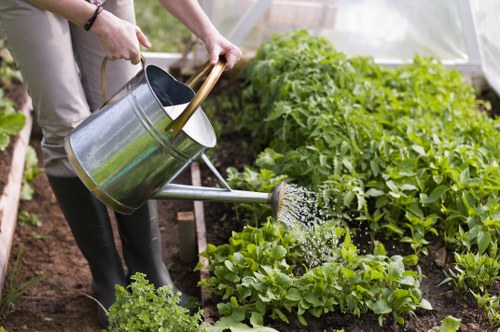Garden Maintenance in Finsbury Park
Welcome to Your Finsbury Park Garden

Maintaining a garden in Finsbury Park is both a rewarding and fulfilling endeavor. Whether you're a seasoned gardener or a novice, understanding the unique climate and soil conditions of Finsbury Park can help you create a thriving outdoor space.
The vibrant community of Finsbury Park offers a diverse range of plant species, allowing gardeners to experiment with various foliage and flowering plants. Proper garden maintenance not only enhances the beauty of your home but also contributes to the overall well-being of the environment.
In this comprehensive guide, we'll explore essential garden maintenance tips tailored specifically for Finsbury Park's climate and urban setting. From seasonal planting schedules to pest control strategies, you'll find everything you need to keep your garden flourishing year-round.
Understanding Finsbury Park’s Climate

Finsbury Park enjoys a temperate climate with distinct seasons, which influences the types of plants that can thrive in the area. Summers are generally warm with moderate rainfall, while winters can be chilly with occasional frost. Spring and autumn offer mild temperatures, making them ideal for planting and garden preparation.
To maximize your garden’s potential, it's crucial to select plants that are well-suited to these climatic conditions. Hardy perennials, drought-resistant shrubs, and seasonal annuals can all play a role in creating a resilient garden.
Additionally, understanding the microclimates within your garden—such as areas with more shade, wind exposure, or varying soil compositions—can help you make informed decisions about plant placement and maintenance practices.
Seasonal Garden Maintenance

Each season presents unique challenges and opportunities for garden maintenance in Finsbury Park. Adapting your care routine to the changing weather can ensure your garden remains healthy and vibrant throughout the year.
- Spring: Focus on planting new blooms, pruning dead branches, and preparing soil for the growing season.
- Summer: Implement regular watering schedules, manage pests, and maintain mulch to retain moisture.
- Autumn: Clean up fallen leaves, plant bulbs for spring, and protect sensitive plants from frost.
- Winter: Prune trees and shrubs, plan for the next planting season, and cover delicate plants to shield them from harsh conditions.
By following a seasonal maintenance schedule, you can address potential issues proactively and enjoy a lush garden all year long.
Soil Health and Fertility

Healthy soil is the foundation of a thriving garden. In Finsbury Park, the soil can vary from clay-heavy to sandy, each with its own set of challenges. Conducting a soil test can help determine its pH level and nutrient content, guiding you in making necessary amendments.
Organic matter such as compost or well-rotted manure can improve soil structure, enhance fertility, and promote beneficial microbial activity. Regularly adding mulch not only conserves moisture but also suppresses weeds and enriches the soil as it breaks down.
Proper soil maintenance ensures that your plants receive the essential nutrients they need to grow strong and resist diseases, ultimately leading to a more productive and resilient garden.
Watering Techniques

Efficient watering is key to maintaining a healthy garden in Finsbury Park. Overwatering can lead to root rot and other fungal diseases, while underwatering can stress plants and stunt their growth.
Implementing drip irrigation systems can provide targeted watering directly to the plant roots, reducing water waste and ensuring consistent moisture levels. Additionally, watering early in the morning or late in the evening minimizes evaporation and allows plants to absorb water more effectively.
Using soaker hoses and rain barrels can also contribute to water conservation efforts, making your garden not only beautiful but also environmentally friendly.
Pest and Disease Management

Pests and diseases can pose significant threats to your garden's health. In Finsbury Park, common garden pests include aphids, slugs, and caterpillars, while diseases such as powdery mildew and rust can affect various plants.
Implementing integrated pest management (IPM) strategies can help control these issues sustainably. This includes encouraging beneficial insects like ladybugs, using natural repellents, and maintaining plant health through proper care practices.
Regularly inspecting your plants for signs of pests or diseases allows for early intervention, preventing larger infestations and minimizing damage to your garden.
Pruning and Trimming

Pruning and trimming are essential for maintaining the shape, health, and productivity of your plants. Proper pruning techniques can encourage bushier growth, remove dead or diseased branches, and improve air circulation within your garden.
Different plants require different pruning methods, so it's important to familiarize yourself with the specific needs of each species in your garden. For instance, flowering shrubs may need to be pruned after blooming to encourage new blooms, while fruit trees benefit from annual shaping to optimize fruit production.
Investing time in regular pruning not only enhances the aesthetic appeal of your garden but also promotes long-term plant health.
Choosing the Right Plants

Selecting the appropriate plants for your Finsbury Park garden is crucial for success. Consider factors such as sunlight exposure, soil type, and moisture levels when choosing plant species.
Native plants are an excellent choice as they are well-adapted to the local climate and soil conditions, requiring less maintenance and water. Additionally, incorporating a mix of perennials and annuals can provide continuous color and interest throughout the seasons.
When planning your garden layout, think about the height, texture, and color of plants to create a balanced and visually appealing landscape.
Mulching for Garden Health

Mulching is a vital practice in garden maintenance, offering multiple benefits such as moisture retention, temperature regulation, and weed suppression. In Finsbury Park, where seasonal changes can impact soil conditions, applying mulch can help stabilize the soil environment.
Organic mulches like bark, straw, and compost gradually decompose, enriching the soil with nutrients. Inorganic mulches, such as gravel or plastic sheeting, can provide long-term weed control and moisture preservation.
Applying mulch around your plants not only improves their health but also enhances the overall appearance of your garden, giving it a neat and well-tended look.
Lawn Care and Maintenance

A well-maintained lawn serves as the centerpiece of any garden. In Finsbury Park, maintaining a healthy lawn involves regular mowing, aeration, and fertilization.
Choosing the right grass type for your region ensures resilience against local pests and weather conditions. Incorporating a mix of grass species can enhance the lawn's texture and color, creating a more vibrant and durable turf.
Proper lawn care not only enhances the beauty of your garden but also provides a lush, green space for relaxation and recreation.
Hardscaping Elements

Incorporating hardscaping elements like patios, walkways, and garden beds can add structure and functionality to your garden. These features not only enhance the aesthetic appeal but also provide practical spaces for outdoor activities.
Choosing materials that complement your garden’s style and colors ensures a harmonious look. For example, natural stone pathways can create a rustic feel, while modern concrete elements add a sleek, contemporary touch.
Well-planned hardscaping can transform your garden into a versatile space, perfect for entertaining, gardening, or simply enjoying nature.
Composting for Sustainable Gardening

Composting is an environmentally friendly practice that recycles organic waste into nutrient-rich soil amendments. In Finsbury Park, setting up a compost bin can significantly reduce household waste and enhance your garden’s soil health.
By composting kitchen scraps, garden trimmings, and other biodegradable materials, you create a valuable resource that enriches the soil, improves its structure, and promotes beneficial microbial activity.
Incorporating compost into your garden maintenance routine fosters sustainability, reduces the need for chemical fertilizers, and supports a thriving ecosystem.
Irrigation Systems and Water Conservation

Efficient irrigation systems are essential for maintaining a healthy garden in Finsbury Park, especially during the warmer months. Drip irrigation and soaker hoses are excellent options for delivering water directly to the plant roots, minimizing evaporation and runoff.
Implementing timed irrigation schedules ensures that your plants receive consistent moisture without overwatering. Additionally, incorporating rain sensors can help optimize water usage by adjusting the irrigation based on rainfall and weather conditions.
Water conservation not only benefits your garden but also contributes to environmental sustainability, making it a responsible choice for modern gardeners.
Enhancing Garden Aesthetics

Creating a visually appealing garden involves thoughtful design and attention to detail. Incorporating a variety of plant colors, textures, and heights can add depth and interest to your outdoor space.
Using garden ornaments, such as fountains, statues, and lighting, can highlight key areas and create a welcoming atmosphere. Additionally, selecting complementary color schemes and thematic elements can unify the garden’s overall look.
A well-designed garden not only enhances your home's curb appeal but also provides a tranquil retreat where you can relax and enjoy nature.
Sustainable Gardening Practices

Adopting sustainable gardening practices in Finsbury Park promotes environmental stewardship and ensures the long-term health of your garden. This includes using organic fertilizers, conserving water, and supporting local biodiversity.
Planting native species attracts pollinators and beneficial insects, creating a balanced ecosystem that naturally controls pests and supports plant growth.
Implementing energy-efficient tools and reducing chemical usage further enhances the sustainability of your garden, making it a model of eco-friendly living.
Professional Garden Maintenance Services

While DIY garden maintenance can be fulfilling, hiring professional garden maintenance services in Finsbury Park ensures expert care and saves you time. Professionals can provide tailored services, from regular upkeep to specialized treatments, ensuring your garden remains in optimal condition.
Experienced gardeners understand the local climate and soil conditions, allowing them to make informed decisions about plant care and maintenance strategies. They can also offer valuable insights and recommendations to enhance your garden’s beauty and functionality.
Investing in professional services can lead to a more polished and well-maintained garden, giving you peace of mind and more time to enjoy your outdoor space.
Conclusion: Enjoying Your Finsbury Park Garden

Maintaining a garden in Finsbury Park is a rewarding pursuit that combines creativity, care, and a love for nature. By following the tips and strategies outlined in this guide, you can cultivate a beautiful and sustainable garden that thrives throughout the seasons.
Whether you choose to embark on this journey solo or seek the expertise of professional garden maintenance services, the key is consistency and a willingness to adapt to your garden’s evolving needs.
Contact us today to learn more about our garden maintenance services in Finsbury Park and take the first step towards creating your dream garden. Book your service now and transform your outdoor space into a lush, vibrant haven.

